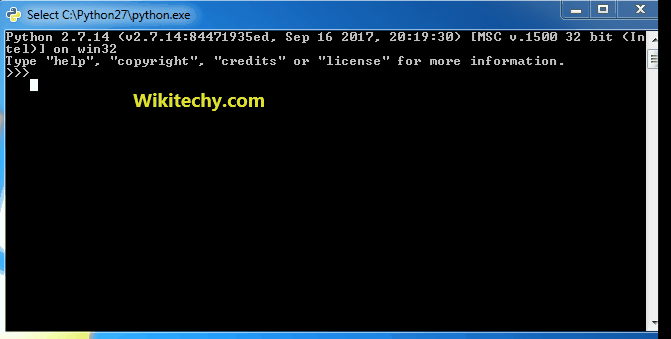1. islice(iterable, start, stop, step) :- This iterator selectively prints the values mentioned in its iterable container passed as argument. This iterator takes 4 arguments, iterable container, starting pos., ending position and step.
2. starmap(func., tuple list) :- This iterator takes a function and tuple list as argument and returns the value according to the function from each tuple of list.

Learn Python - Python tutorial - python iterator tools - Python examples - Python programs
python - Sample - python code :
# Python code to demonstrate the working of
# islice() and starmap()
# importing "itertools" for iterator operations
import itertools
# initializing list
li = [2, 4, 5, 7, 8, 10, 20]
# initializing tuple list
li1 = [ (1, 10, 5), (8, 4, 1), (5, 4, 9), (11, 10 , 1) ]
# using islice() to slice the list acc. to need
# starts printing from 2nd index till 6th skipping 2
print ("The sliced list values are : ",end="")
print (list(itertools.islice(li,1, 6, 2)))
# using starmap() for selection value acc. to function
# selects min of all tuple values
print ("The values acc. to function are : ",end="")
print (list(itertools.starmap(min,li1)))python tutorial - Output :
The sliced list values are : [4, 7, 10] The values acc. to function are : [1, 1, 4, 1]
3. takewhile(func, iterable) :- This iterator is opposite of dropwhile(), it prints the values till the function returns false for 1st time.
4. tee(iterator, count) :- This iterator splits the container into a number of iterators mentioned in the argument.
python - Sample - python code :
# Python code to demonstrate the working of
# takewhile() and tee()
# importing "itertools" for iterator operations
import itertools
# initializing list
li = [2, 4, 6, 7, 8, 10, 20]
# storing list in iterator
iti = iter(li)
# using takewhile() to print values till condition is false.
print ("The list values till 1st false value are : ",end="")
print (list(itertools.takewhile(lambda x : x%2==0,li )))
# using tee() to make a list of iterators
# makes list of 3 iterators having same values.
it = itertools.tee(iti, 3)
# printing the values of iterators
print ("The iterators are : ")
for i in range (0,3):
print (list(it[i]))python tutorial - Output :
The list values till 1st false value are : [2, 4, 6] The iterators are : [2, 4, 6, 7, 8, 10, 20] [2, 4, 6, 7, 8, 10, 20] [2, 4, 6, 7, 8, 10, 20]
5. zip_longest( iterable1, iterable2, fillval.) :- This iterator prints the values of iterables alternatively in sequence. If one of the iterables is printed fully, remaining values are filled by the values assigned to fillvalue.
python - Sample - python code :
# Python code to demonstrate the working of
# zip_longest()
# importing "itertools" for iterator operations
import itertools
# using zip_longest() to combine two iterables.
print ("The combined values of iterables is : ")
print (*(itertools.zip_longest('Wktcy','iieh',fillvalue='_' )))python tutorial - Output :
The combined values of iterables is :
('W', 'i') ('k', 'i') ('t', 'e') ('c', 'h') ('y', '_')
Combinatoric Iterators
1. product(iter1, iter2) :- This iterator prints the cartesian product of the two iterable containers passed as arguments.
2. permutations(iter, group_size) :- This iterator prints all possible permutation of all elements of iterable. The size of each permuted group is decided by group_size argument.
python - Sample - python code :
# Python code to demonstrate the working of
# product() and permutations()
# importing "itertools" for iterator operations
import itertools
# using product() to print the cartesian product
print ("The cartesian product of the containers is : ")
print (list(itertools.product('AB','12')))
# using permutations to compute all possible permutations
print ("All the permutations of the given container is : ")
print (list(itertools.permutations('WTY',2)))python tutorial - Output :
The cartesian product of the containers is :
[('A', '1'), ('A', '2'), ('B', '1'), ('B', '2')]
All the permutations of the given container is :
[('W', 'T'), ('W', 'Y'), ('T', 'W'), ('T', 'Y'), ('Y', 'W'), ('Y', 'T')]
3. combinations(iterable, group_size) :- This iterator prints all the possible combinations(without replacement) of the container passed in arguments in the specified group size in sorted order.
4. combinations_with_replacement(iterable, group_size) :- This iterator prints all the possible combinations(with replacement) of the container passed in arguments in the specified group size in sorted order.
python - Sample - python code :
# Python code to demonstrate the working of
# combination() and combination_with_replacement()
# importing "itertools" for iterator operations
import itertools
# using combinations() to print every combination
# (without replacement)
print ("All the combination of container in sorted order(without replacement) is : ")
print (list(itertools.combinations('1234',2)))
# using combinations_with_replacement() to print every combination
# with replacement
print ("All the combination of container in sorted order(with replacement) is : ")
print (list(itertools.combinations_with_replacement('WTY',2)))python tutorial - Output :
All the combination of container in sorted order(without replacement) is :
[('1', '2'), ('1', '3'), ('1', '4'), ('2', '3'), ('2', '4'), ('3', '4')]
All the combination of container in sorted order(with replacement) is :
[('W', 'W'), ('W', 'T'), ('W', 'Y'), ('T', 'T'), ('T', 'Y'), ('Y', 'Y')]
Infinite Iterators
1. count(start, step) :- This iterator starts printing from the “start” number and prints infinitely. If steps are mentioned, the numbers are skipped else step is 1 by default.
Example :
iterator.count(5,2) prints -- 5,7,9,11...infinitely
2. cycle(iterable) :- This iterator prints all values in order from the passed container. It restarts printing from beginning again when all elements are printed in a cyclic manner.
Example :
iterator.cycle([1,2,3,4]) prints -- 1,2,3,4,1,2,3,4,1...infinitely
3. repeat(val, num) :- This iterator repeatedly prints the passed value infinite number of times. If num. is mentioned, them till that number.
python - Sample - python code :
# Python code to demonstrate the working of
# repeat()
# importing "itertools" for iterator operations
import itertools
# using repeat() to repeatedly print number
print ("Printing the numbers repeatedly : ")
print (list(itertools.repeat(25,4)))python tutorial - Output :
Printing the numbers repeatedly : [25, 25, 25, 25]
